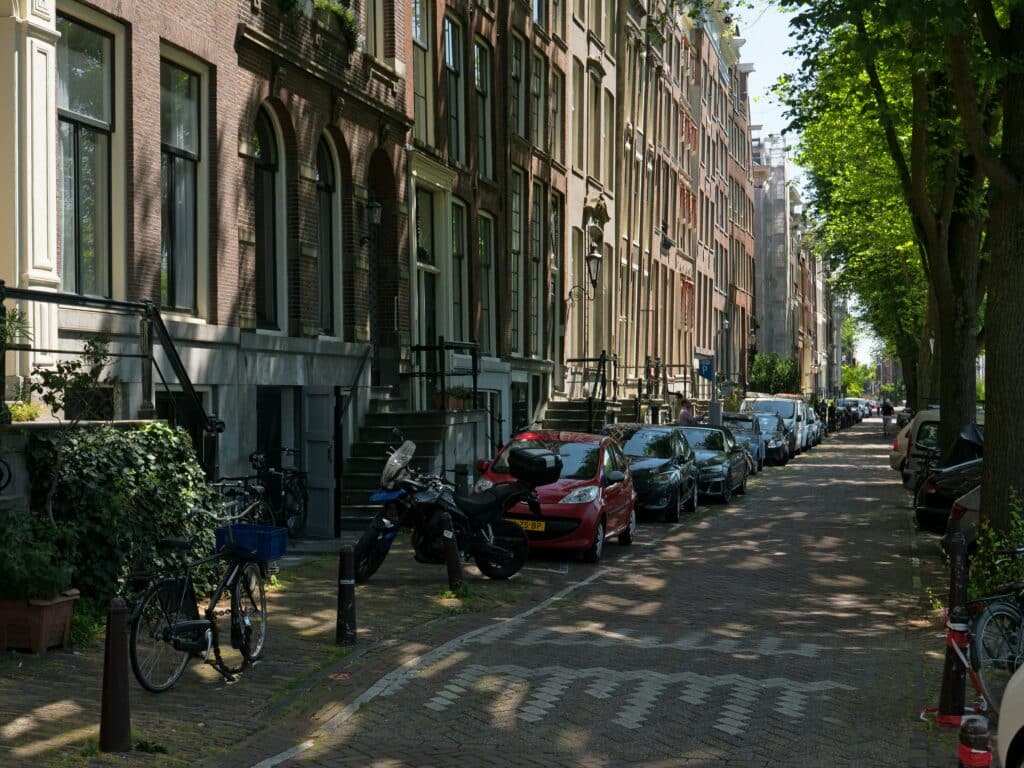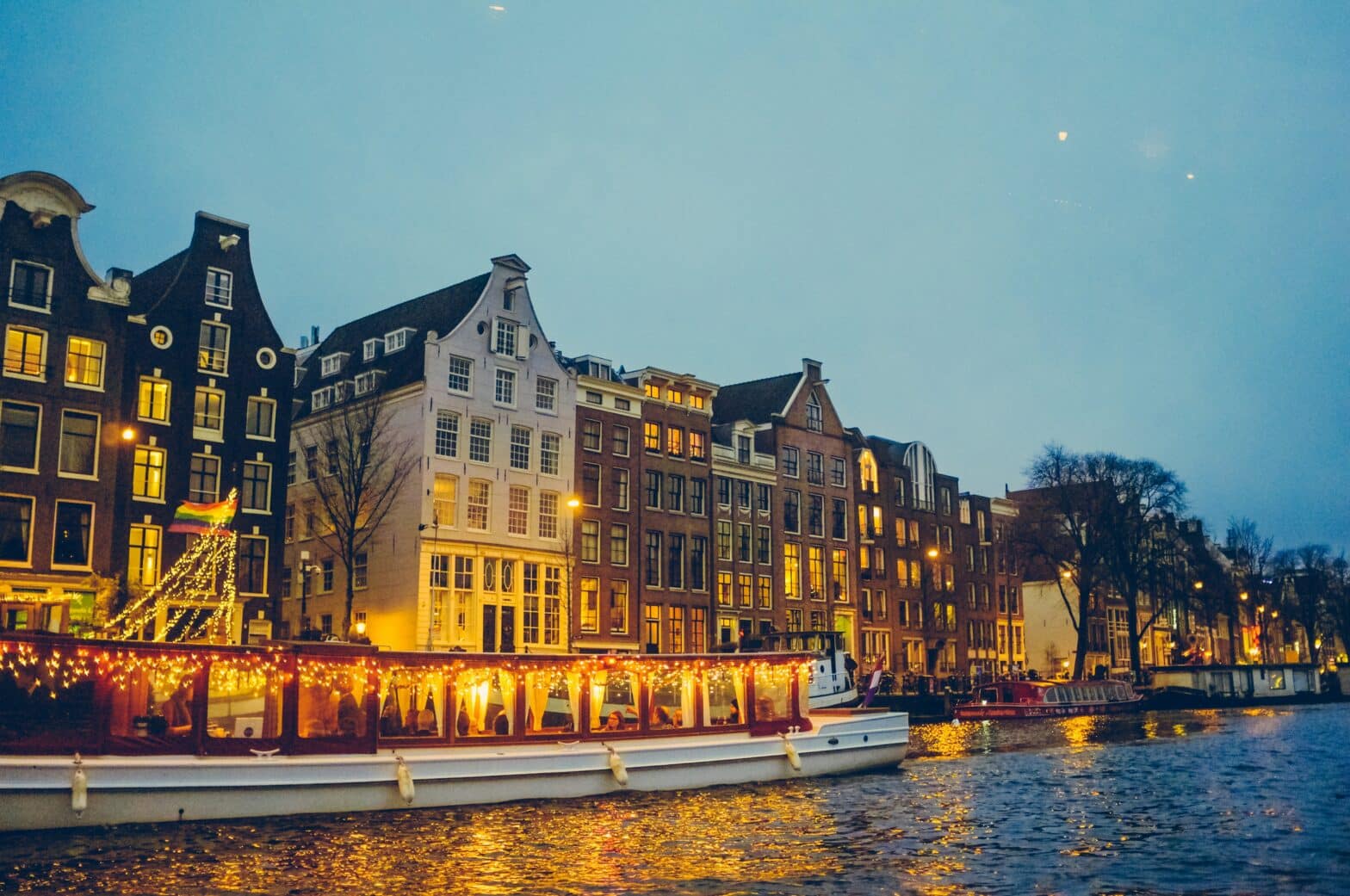A cosmopolitan metropolis with a village feel, Amsterdam is all about conviviality, work-life balance and pragmatism. The prospect of living in a relaxed spirit of tolerance, that characterizes this former fishing village, attracts tens of thousands of expats. From language to accommodation, cost of living to getting around, here is a guide that celebrates the magic, in a thousand and one ways, of life in Amsterdam
Life in Amsterdam: the pros and the cons
The big pros:
- A pleasant city to live in: more cycling, less pollution!
- Tolerance and open-mindedness are not a myth
- High levels of security, low crime rates
- A highly efficient transport system
- One of the best health systems in the world
- Excellent career opportunities
- Enviable work-life balance – Close proximity to nature
A few cons:
- It’s rainy and humid most of the year!
- High cost of living
- Few gastronomic delights
- Language barrier: Dutch is not an easy language to learn
Amsterdam versus London
Amsterdam and London are two large, multicultural and dynamic metropolises. The Venice of the North, as Amsterdam is known, is a more peaceful city, on a more human scale, offering a higher quality of life than its British counterpart.
Berlin versus London
What advantages does Amsterdam have over Berlin? It is more worldly, the atmosphere is more relaxed and English is spoken broadly. The Dutch city is also more accessible than its German cousin and offers a more pleasant living environment, with nature nearby!
How do I find accommodation in Amsterdam?
The rental market in Amsterdam is clearly under pressure: there are few apartments available in relation to the number of inhabitants. The high population density and the city’s great popularity explain the scarcity of properties and the fairly high property prices, which are close to those in other European cities such as Paris. Similarly, the closer you are to the city centre, the higher the rents you will have to pay. For example, a furnished two-bedroom flat in the city centre costs around €2,200 a month. Some leases include service charges, but be aware that this is not always the case!
To find that rare gem, you don’t need to build a robust application, as is the case in some other European countries, your proof of income will suffice. However, you will need to be patient, but quick and dynamic at the same time! Websites such as Pararius, Funda and Direct Wonen can help you find your new home in the land of windmills. Don’t hesitate to check out the ads for sublet properties as in Geneva, sublets are not uncommon in Amsterdam!
And to ensure that you are on the right side of the law, make sure the apartment you wish to rent is eligible for the Dutch social security number (BNS). Check to find the section in the adverts indicating whether or not registration is possible!

What are the best areas for expatriates?
De Pijp is one of the most popular neighbourhoods for expats, whether for families, couples or singles, because of its lively atmosphere and proximity to the city centre. Buitenveldert is a peaceful and easily accessible international district that is also very popular with expatriate families. Because of its unique and picturesque atmosphere, Jordaan is one of Amsterdam’s most popular neighbourhoods for a wide variety of expat profiles. While young professionals will appreciate the hustle and bustle of the city centre, families may prefer the peace and quiet of Westerpark, in the north-west of the city. For more affordable accommodation, head to Noord and Nieuw-West !
Daily life in Amsterdam
Can you live in Amsterdam without speaking Dutch?
Yes… and no! While many Amsterdammers speak English and it’s easy to find English-speaking jobs in international companies, learning Dutch quickly becomes a necessity in everyday life, especially if your aim is social integration.
High cost of living
Amsterdam is one of Europe’s most expensive cities. Accommodation is one of the biggest expenses, with rent accounting for 40% of one’s monthly budget. For a three-bedroom flat in the city centre, you’ll need to spend between €2,800 and €4,500 a month, plus an average of €256 for utilities (electricity, water, etc.) and an internet subscription of around €50. And if you want to send your children to a private international school, be aware that tuition fees range from €7,100 to €30,000 per school year.
Transport: all about the bicycle!
It’s no myth that bicycles are the favourite means of transport in Amsterdam! And there are several models to choose from, depending on the number of passengers! For example, expatriate families can invest in a cargo bike to put their children in the front or a three-seater. Many bikes, regardless of model, are fitted with electronic chips that can be used to locate them in the event of theft.
If you’re not a cycling fan, don’t worry! The city, and the country in general, feature an efficient public transport network, especially buses and trams. To use public transport, do not forget to purchase a rechargeable OV-chipkaart.
Family life in Amsterdam
Living in the Netherlands, and Amsterdam in particular, means taking advantage of an excellent education system from primary school to university.
You’ll have a choice of Dutch schools, both state and private, as well as private international schools. In the Dutch education system, which places great emphasis on sport, there are two types of establishment that are fully or partially subsidised by the state: state schools which provide education mainly in Dutch (free of charge) and private fee-paying institutions that are either bilingual (TTO- Tweetalig onderwijs) or international (Dutch International Schools – DIS).
You can also find international schools that are not part of the Dutch education system and follow either the curriculum of a particular country, for example, The British School of Amsterdam and the Lycée français Vincent Van Gogh or the International Baccalaureate curriculum at the International School of Amsterdam or Amity International School. Tuition in these schools is more expensive than for private schools in the Netherlands, with fees up to €30,000 a year.
Childcare
In Amsterdam, parents with young children have several options for childcare: kinderdagverblijf public nursery for children aged between six weeks and four years, open during office hours; private nurseries where fees are higher and hours are more flexible and longer than in the public sector; and peuterspeelzalen ‘pre-school’ care for children aged between two and four years. Some companies also have childcare facilities at their workplace or nearby, which is very convenient for employees.
Family activities
There’s plenty to do with your family in and around Amsterdam! The Venice of the North is packed with museums, each more famous than the last, including the Van Gogh Museum, the Rijksmuseum, the NEMO Science Museum and the Naval Museum. Rain or shine, bike rides are always a good idea for a family outing! And outside the city, less than an hour away by car or train, there are plenty of options for family excursions: the beach at Zandvoort, the picturesque village of Zaanse Schans or the naturalist’s delight, Hoge Veluwe National Park!
Working in Amsterdam
The job market in the Netherlands is very dynamic, and full employment is just around the corner.
You don’t need to speak Dutch to find a job in Amsterdam, but you do need a good command of English to be able to work and communicate with your colleagues, especially in Dutch and international companies. Numerous multinationals such as Tesla and Netflix, as well as start-ups, have made Amsterdam their home, offering numerous career opportunities for locals and expatriates alike.
Promising sectors include technology (FinTech), healthcare (MedTech, which is booming), communications, research and commerce.
In terms of working conditions, the average working week is between 30 and 45 hours although in most work contracts, working hours do not exceed 40 hours and flexibility is encouraged. It is not uncommon to find 4/5ths employment. And forget about long lunch breaks and overtime, all of which are far from the norm in Amsterdam!
Healthcare in the Netherlands
Universal, liberal and social, the Dutch health system, based on modern public and private medical establishments, is one of the best in Europe and the world and relies on modern public and private medical facilities.
While all residents of the country are obliged to take out local basic health insurance (basisverzekering), expatriates often prefer the flexibility and tailored-made solutions offered by international health cover that works in Amsterdam and worldwide.
Amsterdam, in particular, boasts some top-notch health facilities. In fact, it’s an Amsterdam hospital that tops Newsweek’s list of the country’s best hospitals. It’s the Amsterdam University Medical Center (Amsterdam UMC), a collective of two university hospitals that shines as much for the excellence of its services as for its facilities. BovenIJ Ziekenhuis and Onze Lieve Vrouwe Gasthuis are also among the best Dutch medical institutions.
